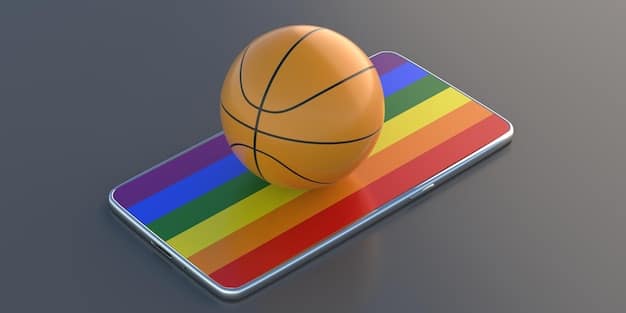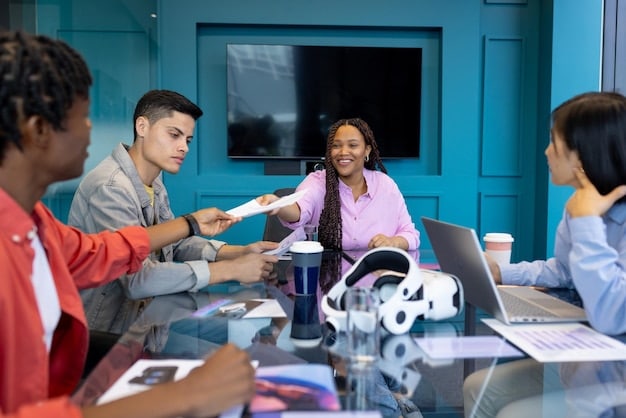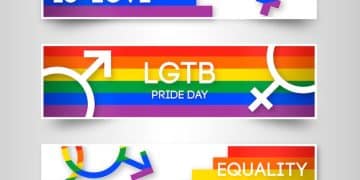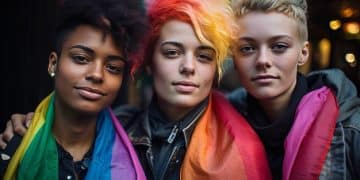US Esports & LGBT Diversity: A Data-Driven Analysis of Commitment

US esports organizations: Are they truly committed to LGBT diversity? This data-driven analysis explores the visible inclusion and implemented diversity practices within US esports to evaluate their dedication to LGBT inclusivity.
The world of esports is rapidly growing, and with it comes a responsibility to foster inclusive environments. But when it comes to US esports organizations: Are they truly committed to LGBT diversity? It’s a question that deserves careful examination. Many organizations claim to support LGBTQ+ inclusivity, but how much of that is genuine commitment versus performative allyship?
Let’s dive into a data-driven analysis that explores how these organizations are walking the talk, or if there’s still a long way to go.
Analyzing LGBT Diversity in US Esports Organizations
The esports industry, while celebrated for its competitive spirit and entertainment value, faces increasing scrutiny regarding its diversity and inclusion practices. A key area of focus is the commitment of US esports organizations: Are they truly committed to LGBT diversity? Understanding this commitment requires more than just surface-level observations; it demands a rigorous, data-driven analysis.
Visible Representation vs. Substantive Action
One of the first things we can look at is representation. Are there openly LGBT players and staff within these organizations? While visibility is important, it’s not everything. The deeper question lies in the policies and programs in place to support these individuals and ensure they feel safe, respected, and valued.
- Active Inclusion Strategies: Are organizations actively recruiting LGBT talent?
- Supportive Policies: Do they have clear anti-discrimination policies that protect LGBT individuals?
- Safe Spaces: Do they foster environments where LGBT individuals can be their authentic selves without fear of harassment or discrimination?
It’s essential to move beyond mere visibility and examine what concrete steps organizations are taking to create a truly inclusive environment. The presence of openly LGBT individuals is a positive indicator, but not sufficient to measure genuine intent of the US esports organizations: Are they truly committed to LGBT diversity?

In conclusion, assessing the real LGBT diversity requires examining both visible representation and underlying supportive structures.
The Role of Sponsorships and Partnerships
Sponsorships and partnerships can be telling indicators of an organization’s commitment to LGBT diversity. When US esports organizations: Are they truly committed to LGBT diversity?, those commitments play a pivotal role. The companies they choose to associate with can reflect their values, including their stance on LGBT issues.
Do they partner with organizations that actively support the LGBT community? Or do they shy away from such associations, possibly due to concerns about alienating certain audience segments?
Evaluating Partner Alignment
Organizations genuinely committed to LGBT diversity often seek partnerships with companies that share their values. This could include collaborations with LGBT advocacy groups, sponsorships of LGBT events, or support for LGBT charities.
- Community Engagement: Do organizations engage in partnerships with LGBT community groups?
- Event Sponsorships: Are they sponsoring LGBT-focused events within the esports community?
- Philanthropic Efforts: Do they contribute to LGBT charities or initiatives?
Conversely, organizations that prioritize profit over principles might avoid such partnerships, fearing backlash or a perceived negative impact on their bottom line through the US esports organizations: Are they truly committed to LGBT diversity?. The choice of sponsorships speaks volumes about an organization’s true values.
Ultimately, an organization’s choice of partners significantly impacts its credibility within the LGBT community.
Internal Policies and Training Programs
Internal policies and training programs are critical components of any organization’s efforts to promote LGBT diversity and inclusion. A strong commitment to LGBT diversity means having clear policies, comprehensive training, and ongoing support systems in place through the US esports organizations: Are they truly committed to LGBT diversity?. It goes beyond having a statement on a website and requires actionable steps.
Without adequate policies and training, well-intentioned efforts can fall flat, and the organization may inadvertently perpetuate harmful stereotypes or discriminatory practices.
Key Policy Areas
The key policies to watch out for would include non-discrimination policies and avenues through which employees and players can voice their concerns. Transparency here is key.
- Non-Discrimination Policies: Are there explicit policies prohibiting discrimination based on sexual orientation and gender identity?
- Reporting Mechanisms: Are there clear and accessible channels for reporting incidents of harassment or discrimination?
- Inclusive Language Guidelines: Are there guidelines promoting the use of inclusive language and terminology?
Training programs serve to educate employees and players about LGBT issues, promote understanding and empathy, and equip them with the skills to create a more inclusive environment and support the US esports organizations: Are they truly committed to LGBT diversity?. It’s crucial that this goes beyond basic sensitivity lectures.

In conclusion, robust internal policies and training programs are essential for fostering a culture of LGBT inclusion in US esports organizations.
Public Statements vs. Real-World Impact of Esports Organizations
It’s one thing for US esports organizations: Are they truly committed to LGBT diversity?. It’s another to follow through and deliver genuine impact. Many organizations will issue public statements of support during Pride month or in response to LGBT-related controversies. Without action, they ring hollow.
The true test lies in whether these words translate into meaningful actions that positively impact the lives of LGBT individuals within the esports community.
Measuring Impact and Accountability
To assess the real-world impact of these statements, organizations need to actively track their progress, measure outcomes, and hold themselves accountable for achieving their stated goals.
- Metrics and Reporting: Are organizations setting measurable goals for LGBT inclusion and publicly reporting on their progress?
- Community Feedback: Are they actively seeking feedback from the LGBT community and using it to inform their strategies?
- Transparency and Accountability: Are they transparent about their efforts and willing to be held accountable for their actions?
Organizations looking to deliver genuine impact must move beyond lip service. They must prioritize action, accountability, and continuous improvement to be considered a part of the US esports organizations: Are they truly committed to LGBT diversity?.
Ultimately, the impact of public statements should be measured by whether the real-world makes a difference for the LGBT community.
The Role of Fans and Community Pressure
Fans and the broader esports community wield significant influence over US esports organizations, particularly when it comes to diversity and inclusion. Community pressure is key to ensuring that US esports organizations: Are they truly committed to LGBT diversity?. In the age of social media and instant communication, fans can quickly voice their opinions and hold organizations accountable for their actions. This power can be harnessed to drive positive change.
Organizations that ignore community concerns risk alienating their fan base, tarnishing their reputation, and ultimately damaging their bottom line.
Leveraging Fan Power
Fans can play a pivotal role in advocating for LGBT diversity by:
- Raising Awareness: Using social media to highlight instances of discrimination or celebrate examples of inclusion.
- Boycotting Organizations: Refusing to support organizations that are perceived as anti-LGBT or lacking in their commitment to diversity.
- Supporting Inclusive Organizations: Actively supporting and promoting organizations that prioritize LGBT diversity and inclusion.
It’s crucial for fans to understand the influence they hold. By using this power responsibly and strategically, they can help create a more inclusive and welcoming environment for LGBT individuals in esports, because US esports organizations: Are they truly committed to LGBT diversity?.
Community pressure should be wielded to push for greater transparency and accountability from US esports organizations.
| Key Point | Brief Description |
|---|---|
| 🤝 Partnerships | Alliances with LGBT groups show genuine support. |
| 📚 Training | Internal programs foster understanding and inclusion. |
| 📣 Public Image | Words must align with actions for LGBT groups in the US esports scene. |
| ✊ Community | User engagement enforces accountability for LGBT diversity. |
Frequently Asked Questions
LGBT diversity in esports refers to the inclusion and representation of individuals with diverse sexual orientations and gender identities, ensuring fair treatment, equal opportunities, and a welcoming environment for all.
LGBT diversity is crucial as it ensures inclusivity, fosters innovation, attracts diverse talent, and enhances the overall esports community by promoting respect and equal opportunities for everyone.
US esports organizations can demonstrate commitment by implementing inclusive policies, supporting LGBT initiatives, partnering with LGBT groups, and actively promoting a safe and welcoming environment for all members.
Sponsorships reflect an organization’s values. Sponsoring LGBT events or partnering with LGBT groups signals a genuine commitment to diversity by financially supporting initiatives that promote LGBT inclusion.
Fans can support inclusive organizations, advocate for fair treatment, call out discrimination, and use their voices to promote a welcoming environment, encouraging US esports organizations: Are they truly committed to LGBT diversity?, and for all members of the esports and gaming communities.
Conclusion
In conclusion, assessing whether US esports organizations: Are they truly committed to LGBT diversity? requires a multifaceted approach, examining visible representation, policy implementation, community engagement, and the overall impact on LGBT individuals within the industry. Moving beyond performative gestures is essential for creating meaningful change.
Ultimately, community pressure, transparent practices, and a genuine dedication to inclusivity will drive US esports organizations toward greater LGBT diversity, making the gaming world more welcoming for every player.





